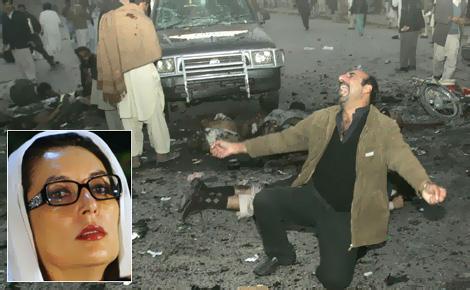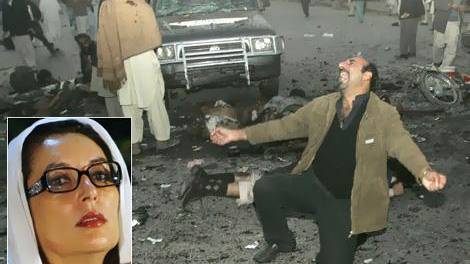UN investigators blame inadequate security for Benazir Bhutto’s assassination
Source: metronews.ca
"The commission believes that the failure of the police to investigate effectively Ms. Bhutto’s assassination was deliberate," the report said. "These officials, in part fearing intelligence agencies’ involvement, were unsure of how vigorously they ought to pursue actions, which they knew, as professionals, they should have taken."
A U.N. commission on Thursday blamed inadequate security by Pakistan’s federal, state and district governments for the 2007 assassination of the country’s former prime minister, Benazir Bhutto.
The panel said her death could have been prevented if the government under then-President Pervez Musharraf, the Punjab state government, and the Rawalpindi District Police had taken adequate measures "to respond to the extraordinary, fresh and urgent security risks that they knew she faced."
Bhutto was killed in a Dec. 27, 2007, gun and suicide-bomb attack as she was leaving a rally in the garrison town of Rawalpindi, where she was campaigning to return her Pakistan People’s Party to power in parliamentary elections.
"Ms. Bhutto’s assassination could have been prevented if adequate security measures had been taken," the commission said.
Musharraf’s government blamed Baitullah Mehsud, a Pakistani militant commander with reported links to al-Qaida. Officials at the U.S. Central Intelligence Agency also said Mehsud was the chief suspect.
But Bhutto’s party repeatedly hinted that Musharraf or his allies were involved and demanded a U.N. probe, claiming it was the only way the whole truth would be revealed.
The U.N. report found that the investigation into her death was severely hampered by intelligence agencies and other government officials "which impeded an unfettered search for the trust."
It said Pakistan’s powerful Inter-Services Intelligence conducted parallel investigations, gathering evidence that was only selectively shared with the police.
"The commission believes that the failure of the police to investigate effectively Ms. Bhutto’s assassination was deliberate," the report said. "These officials, in part fearing intelligence agencies’ involvement, were unsure of how vigorously they ought to pursue actions, which they knew, as professionals, they should have taken."
The commission urged Pakistani authorities to carry out a "serious, credible" criminal investigation that "determines who conceived, ordered and executed this heinous crime of historic proportions, and brings those responsible to justice."
"Doing so would constitute a major step toward ending impunity for political crimes in this country," it said.
The report was originally scheduled to be presented on March 30 but Pakistan’s President Asif Ali Zardari asked Ban to delay the release of its findings on his wife’s killing, and the secretary-general agreed.
Pakistan’s presidential spokesman, Farhatullah Babar, said the government asked for the delay so the commission could attempt to question two heads of state who he said had called Bhutto before her death warning her of "serious threats to her life." The commission responded saying its probe had been completed.
The secretary-general agreed to appoint a commission to assist Pakistan by determining the facts and circumstances of Bhutto’s death and it began work on July 1, 2009.
Under terms agreed to by the U.N. and the Pakistani government, Pakistani authorities would determine any criminal responsibility.
The secretary-general set up a special trust fund to pay for the commission’s work and asked for voluntary contributions. U.N. associate spokesman Farhan Haq said Wednesday that the Pakistani government was the major contributor.
Article from: MetroNews.ca






















